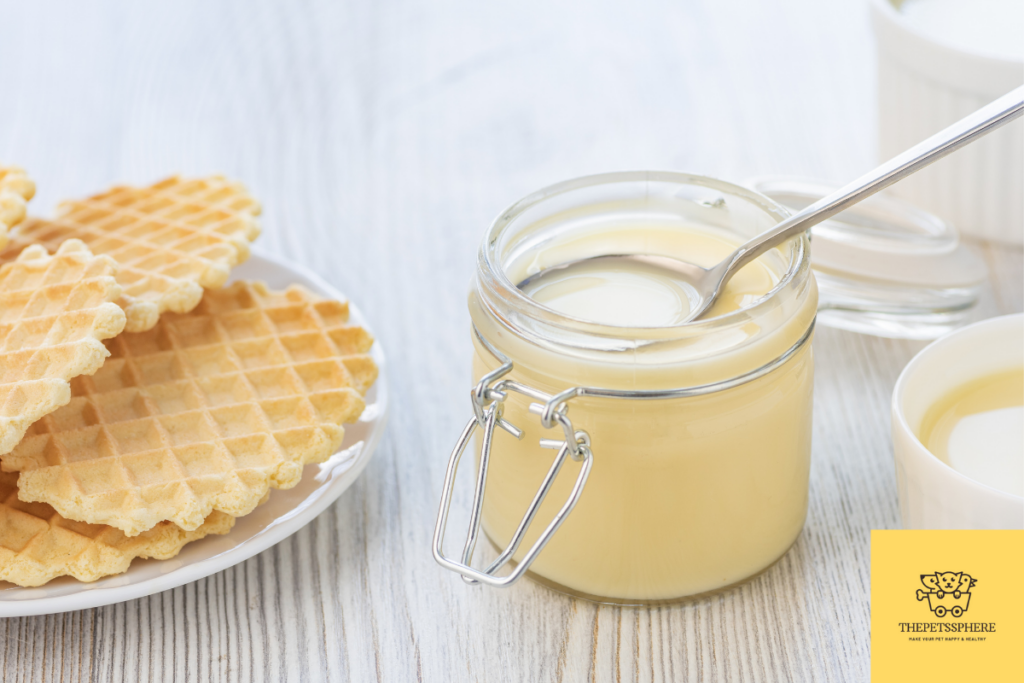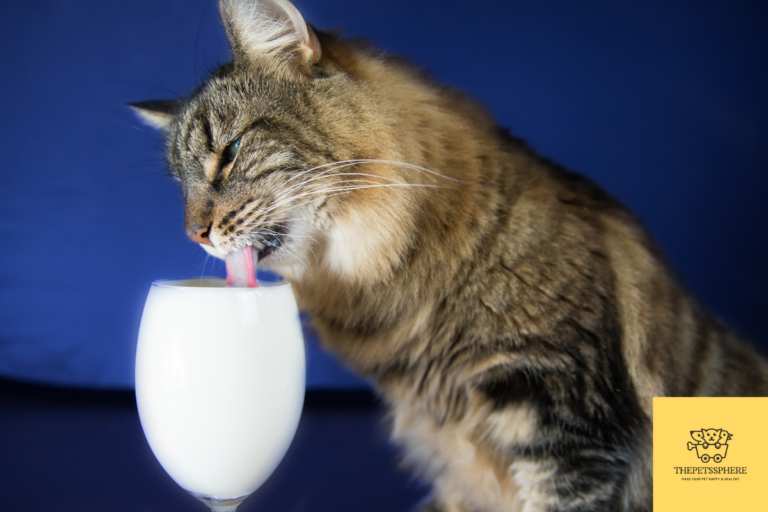Cats are cute, loveable, and cuddly companions that need a lot of care to stay healthy.
If you’ve ever been to a cat show, you may have seen cats drinking evaporated milk. That is not actually safe for them and can cause illness or death in some cases.
In this article, we will discuss whether cats can have evaporated milk or not. We will also talk about risks of offering evaporated milk to your cats and kittens.
We will also answer some questions related to this.
Evaporated milk is not the best option for cats because it contains high amounts of concentrated fat and lacks essential nutrients, including protein which can lead to malnutrition in cats.
It also lacks other nutrients to support the health of a cat such as omega-3 fatty acids or taurine that are found naturally in fresh whole dairy products like cow’s milk.
Evaporated milk is a type of milk that has had 60% of the water removed from it, so as you can imagine, there’s not much nutritional value left in it for us humans either. However, many people have asked if their cat can drink evaporated milk- so let’s explore that question!
Is Evaporated Milk Safe For Cats?
Sadly, no! There are many risks associated with giving your cat evaporated milk.
This is not safe for them and can cause illness or death in some cases. Here are 5 reasons why evaporated milk is not safe for cats:
1) Evaporated milk is not safe to give your cats because they are lactose intolerant! Cats cannot process sugars in evaporated milk
The sugar found in evaporated milk can cause stomach upset, vomiting, diarrhea and dehydration.
2) Evaporated milk contains high levels of sodium which when consumed by our feline friends will cause low blood pressure leading to organ failure or death.
3) If your cat has an underlying kidney disease that’s already weakened their kidneys, it could lead to more rapid decline in renal function
4) Evaporated cows’ milk has a higher protein content which can lead to an overgrowth of bacteria in the intestines (possible resulting condition: inflammatory bowel disease).
5) Finally, evaporated milk contains large amounts of vitamin D that is toxic for cats.
Is Evaporated Milk Okay for Kittens?
Your cat just had a litter of kittens? You might be tempted to give them evaporated milk as an alternative to kitten formula, but there are several reasons why this would not be the best idea. Kittens need special nutrients that evaporated milk does not provide, so they will probably get sick from it. Evaporated milk also has a much lower protein and fat content than regular cow’s milk, which is what kittens need for growth.
First and foremost, when you are feeding a kitten they should always be fed warm food because it improves their digestion.
Secondly, one of the most common issues is anemia in newborn kittens due to a lack of iron in the diet. Kittens need 3-4 times more iron than adult cats and there are few ways to get enough through natural sources without giving them evaporated milk which has none!
Thirdly, evaporated milk has high levels of sodium which can lead to dehydration in newborns.
Fourthly, evaporated milk contains too much calcium which can cause kidney stones or bladder sludge- both of these things are very bad for kittens!
Lastly, cats have different nutritional needs than humans do so it’s best to feed them what they need.
Can You Give Cats Carnation?
Cats should not drink Carnation evaporated milk. It’s filled with unnecessary ingredients that is bad for their health.
Remember these products are made for humans not for pets .
One major concern with cats is when they drink carnation evaporated milk- this can cause feline diabetes!
Carnation evaporated milk contains Carrageenan which has been linked to causing type 1 diabetes in both humans and animals. This common household ingredient causes an inflammatory response within the pancreas which can lead to insulin-dependent diabetes mellitus (IDDM) or type 1 diabetes mellitus (T1DM). The risk for developing IDDM increases as exposure time goes up- so it’s important for cat owners to be aware of the dangers!
A single tablespoon of the stuff has three-quarters of the daily recommended allowance for sodium, so even a small sip could have negative effects on your cat’s heart health.
What Kind of Milk can Newborn Kittens Drink?
The choice of milk for a newborn kitten is an important decision that should be made with the help of a veterinarian. There are many different types of milk available, and it’s important to find one that the kitten can digest well.
Kittens are usually weaned from their mother’s milk by the time they’re six weeks old. However, some kittens won’t be ready to drink cow’s milk until they’re a few months old. In this case, it is perfectly fine to give them another type of milk for a short period of time such as goat or soy milk. Goat milk contains 30% less lactose than cow milk.
It is important not to overfeed your kitten because he can get diarrhea which will make him feel very uncomfortable and may cause dehydration too!
Kittens need plenty of fluids so make sure they have fresh water available at all times and that their food contains at least 65% moisture content.
If you’re still unsure about which type is best, talk with your vet about which milk would work best for your baby kitty!

Can Cats Drink Condensed Milk?
Cats are of the few species who can’t drink condensed milk. Cats cannot digest lactose, which is found in dairy products such as condensed milk and cheese. Most cats have a low tolerance for high fat content like what is found in dairy products like butter, cream, and chocolate.
This means that when they ingest these types of food items their stomachs produce an excessive amount of acid to break down the fats or else it will not be digested properly by the cat’s system.
Condensed milk is too high in sugar content: Sugars from foods like condensed milk can lead to feline hyperthyroidism, which causes symptoms such as weight loss, vomiting, diarrhea and more!
So the next time your cat comes running over with an unopened carton of sweetened condensed milk, please don’t give in- cats should never drink condensed milk!
Alternatives to Evaporated Milk for You Cats
If you’re looking for a good substitute, here are some other ways to get your cat’s fix of calcium:
- Raw vegetables such as broccoli, cauliflower, greens, squash, zucchini
- Canned salmon or sardines (at least once every week)
- Sliced cheese (100% pure varieties only!)
- Raw beef bones which are a source of calcium and other nutrients
- Kibble or canned cat food (choose one that has the most calcium)
Final Thoughts
Cats are lactose intolerant, and cannot process the high levels of concentrated lactose found in evaporated milk. Evaporated milk also has a higher concentration of fat than regular milk, which is not healthy for cats because they lack the enzymes necessary to digest it properly. Feed your cat real cow’s milk or other alternatives such as soy or almond milks instead!
If you give your cat this product, they will likely experience stomach problems like diarrhea or vomiting with symptoms that last up to two days after consumption. You may also see an increase in their weight if they start consuming large quantities of evaporated cow’s milk. To avoid these risks associated with giving your cat evaporated milk, try substituting water for some or all of the cow’s milk when preparing a meal for your pet.
Related articles on cat eat
- Can cats eat raw chicken breast
- Can cats eat bread crumbs
- Cats eat popcorn
- Do cats get sick if they eat mice
- Do cats eat lobster
- Are chicken nuggets bad for cats
- Do cats eat bologna
- Can cats eat cheerios as a treat
- Do cats eat pine nuts
- Do cats eat imitation crab meat
- Do cats drink chocolate milk
- Can cats have zucchini
- Do cats eat beef jerky
- Do cats eat figs
- Do cats eat oranges
- Can cats have cashews
- Do cats eat pancakes
- Do cats eat frogs and toads
- Does cats eat pizza
- Can cats have parsley
- Is pudding bad for cats
- Are radishes bad for cats
- Do cats eat beans
- Can cats eat dog treats

